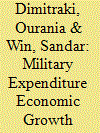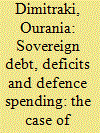| Srl | Item |
| 1 |
ID:
137932


|
|
|
|
|
| Summary/Abstract |
This paper re-examines the long-run causal relationship between military expenditure and economic growth in China over the period 1952–2010. An empirical econometric analysis based on a Barro-style growth model is conducted. By employing the Bartlett corrected trace test, which provides better approximations of the finite sample distribution to determine the rank of cointegration, the results support the existence of a single long-run equilibrium relationship between the variables. Furthermore, it is confirmed that the cumulated shocks of military expenditure primarily originate from different components of shocks that relate to economic development rather than the other way round.
|
|
|
|
|
|
|
|
|
|
|
|
|
|
|
|
| 2 |
ID:
182550


|
|
|
|
|
| Summary/Abstract |
The Hashemite Kingdom of Jordan is a nation that has persisted through turbulent times. The country’s leaders have long attempted to balance the allocation of resources between a strong military and a developing economy in their quest for stability, peace and prosperity. This paper examines and sheds further light on the relationship between Jordan’s military expenditure and its economic growth during the period 1970–2015. Using the Gregory -Hansen cointegration technique allowing for structural breaks, and the ARDL methodology this paper tests the short – and long–run equilibrium relationship between military expenditure and economic growth in Jordan. Furthermore, with the error correction model (ECM) and the CUSUM and CUSUMSQ tests, we examine the stability of the above relationship. The results reveal positive short – and long–run relationships between military expenditure and economic growth in Jordan, during the period under study. This finding has important policy implications for the Jordanian state, as it justifies the transfer of resources to the military, showing that it has not had a negative impact on economic growth.
|
|
|
|
|
|
|
|
|
|
|
|
|
|
|
|
| 3 |
ID:
162250


|
|
|
|
|
| Summary/Abstract |
The outbreak of the sovereign debt crisis at the end of 2009 in Greece led to a severe recession, and constant economic problems. This paper investigates military expenditure among others as a potential factor to the growth of sovereign debt in Greece over the period 1960 until currently. Our empirical findings suggest that high deficits, inflation and military spending have been the primary causes of debt growth in Greece. The structural break models reveal a much higher effect of deficits and inflation in the post-1990 period while the threshold switching regression, based on the level of sovereign debt, indicate that for levels of debt-to-GDP ratio above 90% deficits, inflation and military expenditures had significantly more pronounced effects on government debt changes.
|
|
|
|
|
|
|
|
|
|
|
|
|
|
|
|